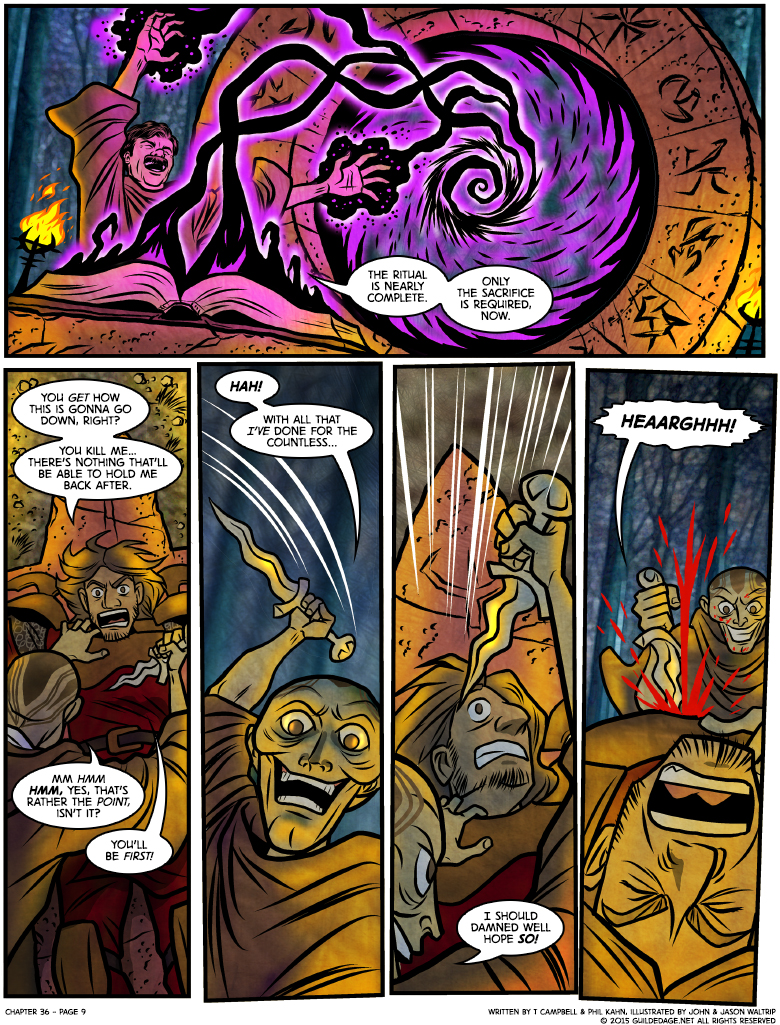Annotated 36-9
 Yeah, there’s just no reasoning with someone who shares absolutely none of your values, not even basic self-preservation (cough).
Yeah, there’s just no reasoning with someone who shares absolutely none of your values, not even basic self-preservation (cough).
On Flo’s instruction, John started bringing the panel borders off-kilter here. The effect was fairly subtle at first; some readers probably didn’t notice even if they normally pay attention to that sort of thing.
Just in case there was any confusion about this, the last panel here features Byron’s dying scream. He’s getting stabbed right in the heart by someone who knows how to do it. Brother Tom is going to keep stabbing and stabbing at his body in the first frame following this page because why not. But Byron’s (second) lifetime ends here.











Huh – I was confused by this on first read; reading ahead a bit, I don’t think I grasped that his berserker curse was puissant enough to literally bring him back from the dead?
Yep. That’s happened before: Syr’Nj confirmed he was dead in the pit before the curse revived him.
Oh dear, that’s true, and I had already forgotten about it.
But doesn’t that also mean that Byron would have had to survive everyone twice in order to survive Battleshire, first during their “regular” frenzy, then during the post-mortem berzerking stage?
At least if we assume that the curse will only revive you once, he could not have died and been revived during the Battleshire Slaughter because he did get revived in later in the arena, and stayed dead after that (At least until Gravedust resurrected them all). But everyone else in Battleshire died their final death right there, so not only was he the sole survivor, but he came out with one life to spare?
Am I getting this wrong?
Well, the term “revived” might be a little misleading here. Let me break this down as starkly as I can. I’ll use “humanoid” as a term for any creature that forms civilizations: human, gnome, dwarf, goblin, whatev. Further, we can assume that all humanoids in this exercise have been bonded with berserker spirits.
What kills a humanoid will not (immediately) kill their berserker. But you’re right, a berserker with a dead host is on its last berserk.
If a humanoid goes berserk and receives no fatal wounds, they will return to normal once the berserker loses its grip. If a humanoid does receive fatal wounds, then the berserk spirit takes over… or stays in charge, if the humanoid was berserking already. In that case, the corpse will return to being a normal corpse once the berserker loses its grip. It hasn’t been established whether a dead body’s berserker spirit is fully dead or merely dormant, but we know it doesn’t just keep restarting and restarting. Otherwise, the scene where Best and Gravedust exhume Byron would’ve been a lot more exciting.
What makes a berserker lose its grip on its host? A few things, best we can tell. One seems to be sheer burnout or running out of things to kill: there’s no other explanation for why Byron ever stopped berserking after Battleshire. One is chemical sedative, and that’s what happened at Souff Kural, which inspired Syr’Nj’s later treatments. But also, there’s a level of damage to the body that even the berserker spirit simply can’t push past: being hacked to ribbons or burnt to ashes would render them incapable of further violence. That is, I imagine, what happened to most of the Battleshireans except Byron, and at least two of them had to get that way due to Byron’s own contributions.
Thanks for the very detailed explanation!
So that means all other berzerking Battleshireans either received fatal damage before running out of targets, or got hacked to pieces before Byron received a “regular” mortal wound. Which means he did not have to come out with one life to spare, but still got away without mortal wounds, in a fight where all his … “opponents” … received a lot more than that.
Given that (opposed to many an RPG), Arkerrans can die from a single hit by an axe, that’s actually not as improbable as it might look otherwise, but still no small thing. Of course, as the statistics nerd in me just interjects: if anyone else had had the dubious luck of being the sole survivor, this story would feature that person instead of Byron, so the question shouldn’t be “how did Byron come out so far ahead” but “what’s the chance that one person made it through without mortal wounds”, and that’s where it gets actually not so improbable.
So what Byron is saying here is “If you strike me down, I shall become more powerful than you can possibly imagine”?
Heh! On some of these pages, I struggle to come up with a single image. Other times, I’m spoiled for choice…
Oh, there’s definitely reasoning with people like that. It just gets really weird, really fast.
The biggest problem is if you’re in a situation where the other simply doesn’t need or want anything you have to offer.
Like a good few villains have found out at their last moments, trying to offer riches and fame to the hero, who be it would not mind honestly partaking in both, but just doesn’t want them the way you’re offering them.
But trying what you think should work and when finding out those don’t actually work, claiming that the cause is lost, is simply not true.
You just need to think outside of your box. ;)
In some cases, that would be so far outside your box, actually, that you can’t think there because you have literally no idea what drives the other person…, which means that anything you can think of that sounds like they should care about it has the same chance to work on them as any other random thing which makes no sense at all. So the task turns from “find good reasons/arguments” to “find out what drives them, and why”.
And for that to happen, you need to get them to explain themselves in a way which you can understand. Which might be the plot-driven reason why so many villains like to gloat a lot at the last minute.
Brother Tom however does not seem willing to give Byron another 10 minutes of exposition at this point, and he would be correct in assuming this wouldn’t help his cause at all. So in this case, there is actually really no reasoning.
In real life … oh well, you can try to reason with most people, but the bigger the gap, the more patience is needed on either side. So depending on both participants’ ability to explain themselves to somebody with a very different view, there may be a chance, but the motivaton to do so usually also declines with the number of shared values, so the practical ability to reason becomes fairly tiny at some point.
Absolutely all of this.